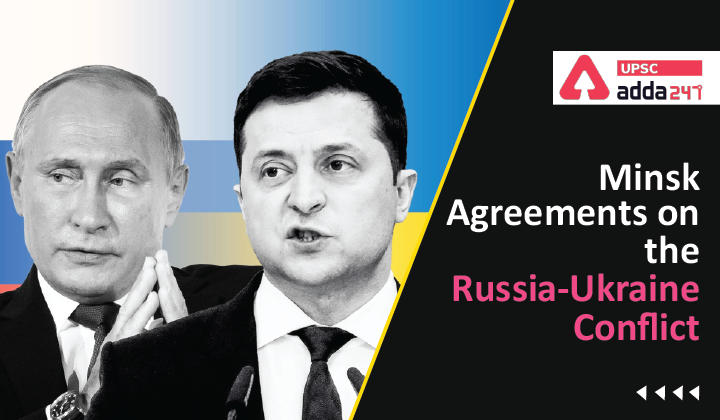Table of Contents
Russia-Ukraine Conflict- Relevance for UPSC Exam
- GS Paper 2: International Relations- Effect of policies and politics of developed and developing countries on India’s interests.
Minsk Agreements and the Russia-Ukraine Conflict- Context
- US authorities warned Russia not to invade Ukraine and urged both countries to return to Minsk agreements designed to end a separatist war by Russian speakers in eastern Ukraine.
- Minsk Agreements to end the Russia-Ukraine crisis were signed in Minsk in 2014 and 2015.
Russia-Ukraine Conflict- Minsk I Agreement
- About: Ukraine and the Russian-backed separatists agreed on a 12-point ceasefire deal in the Belarusian capital Minsk in September 2014.
- Key Provisions: Five months into the Ukraine conflict had killed more than 2,600 people when Minsk I Agreement was signed. A few key provisions are listed below-
- Prisoner exchanges,
- Deliveries of Humanitarian Aid and
- Withdrawal of Heavy Weapons
- Outcome: The Minsk I agreement did not last long as both sides violated different provisions of the Agreement.
Analysis of Sansad TV Discussion: ”Impact of Russia-Ukraine Crisis on India”
Minsk Agreements and the Russia-Ukraine Conflict- Minsk II Agreement
- About: Minsk II Agreement is a 13points agreement signed in 2015.
- Parties Involved: It was signed among representatives of Russia, Ukraine, the Organisation for Security and Cooperation in Europe (OSCE) and the leaders of two pro-Russian separatist regions.
- The leaders of France, Germany, Russia and Ukraine, gathered in Minsk at the same time, issued a declaration of support for the deal.
- Key Provisions: It set out military and political steps that remain unimplemented. A major blockage has been Russia’s insistence that it is not a party to the conflict and therefore is not bound by its terms. The 13 points, in brief, are listed below-
- An immediate and comprehensive ceasefire.
- Withdrawal of all heavy weapons by both sides.
- Monitoring and verification by the OSCE.
- To start a dialogue on interim self-government for the Donetsk and Luhansk regions, in accordance with Ukrainian law, and acknowledge their special status by parliamentary resolution.
- A pardon and amnesty for people involved in the fighting.
- An exchange of hostages and prisoners.
- Provision of humanitarian assistance.
- Resumption of socio-economic ties, including pensions.
- Restoration of full control of the state border by the government of Ukraine.
- Withdrawal of all foreign armed formations, military equipment, and mercenaries.
- Constitutional reform in Ukraine including decentralization, with specific mention of Donetsk and Luhansk.
- Elections in Donetsk and Luhansk on terms to be agreed with their representatives.
- Intensifying the work of a Trilateral Contact Group comprising representatives of Russia, Ukraine, and the OSCE.
Russia-Ukraine Tensions | UNSC Meeting on Ukraine





 TSPSC Group 1 Question Paper 2024, Downl...
TSPSC Group 1 Question Paper 2024, Downl...
 TSPSC Group 1 Answer key 2024 Out, Downl...
TSPSC Group 1 Answer key 2024 Out, Downl...
 UPSC Prelims 2024 Question Paper, Downlo...
UPSC Prelims 2024 Question Paper, Downlo...




